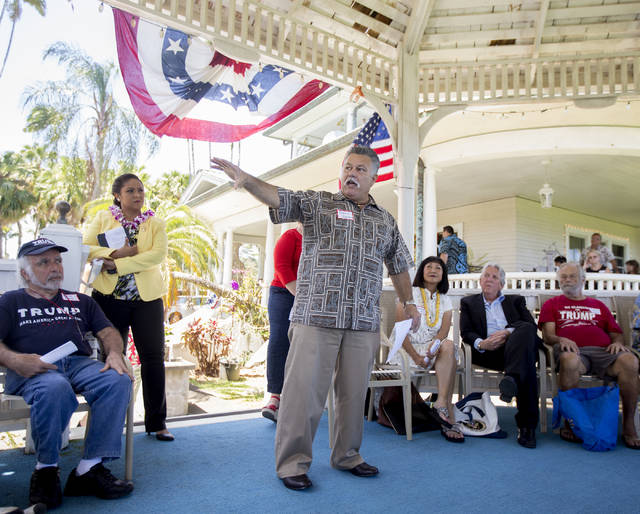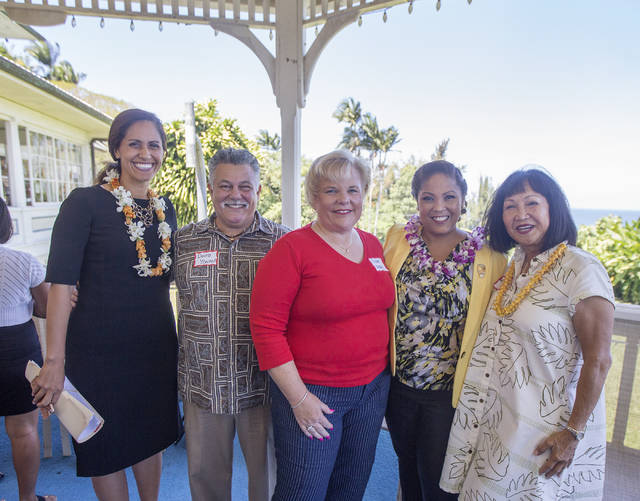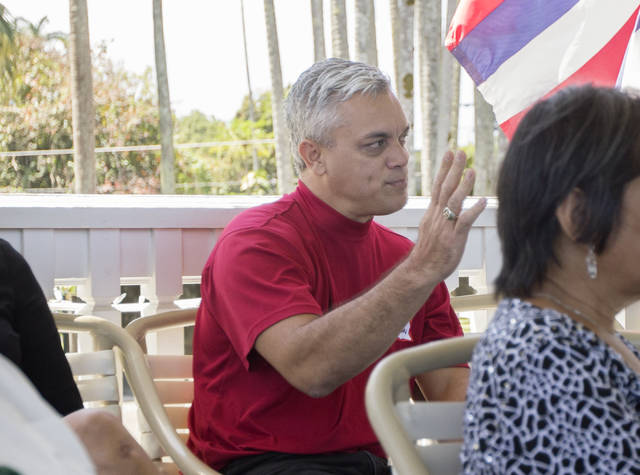After turning out for President Donald Trump last November, East Hawaii Republicans are hoping to bring more political momentum to the local level.
Saturday marked the first-ever East Hawaii Republican County Convention, where party members gathered to select committee officers and delegates for the upcoming state party convention, to be held in May on Kauai.
Until last year Hawaii County was considered one bloc by the state party.
“We are brand-new,” Lorraine Shin-Penn said Saturday of the East Hawaii delegation. Shin-Penn was selected as treasurer at the meeting. David Yonan will serve as East Hawaii County chairman, with Alan Koahou as vice-chairman and Shawn Merril as secretary.
The decision to split Hawaii County Republicans into groups for East and West Hawaii was made during last year’s state convention.
Having separate delegations would ultimately allow for better outreach, Shin-Penn said, and allow East Hawaii to focus on finding the best political candidates for its region.
“We are sending the message that you have choices in our elections,” she said.
During the 2016 election there were five East Hawaii seats available in the state House of Representatives and Senate, all of which went to Democrats. Four of the five had no Republican challengers (Libertarian, Green and other third-party candidates did challenge for the seats).
There are five Republican state representatives and no Republican state senators. In 2016 Sam Slom, the lone Republican Senator for six years, lost his seat to Democrat Stanley Chang.
“We cannot have that happen anymore,” Yonan said.
The overall tone of Saturday’s meeting, attended by about 50 people, was one of optimism, with many in attendance saying that Trump’s election offered a chance to rebuild the Hawaii Republican Party.
“We as a party have not shown any strength … we have not shown strength for anybody to rally behind,” Yonan said.
Part of the problem, he said, was a lack of resources and support for potential candidates. Donors have not turned out for the Republican party to help support political candidates, and candidates themselves were discouraged by being part of the state’s minority party.
“It’s not an easy thing,” said House Minority Leader Andria Tupola, R-Oahu, who spoke at the meeting. “Running for office, putting yourself out there, being judged by people…there’s so much division already within our state, within our party, that if we don’t start working together and working with the same mindset, then we’ll end up with the same result.”
Tupola became House Minority Leader in February, replacing Rep. Beth Fukumoto. The leadership change vote came after the Honolulu Women’s March, where Fukumoto spoke out against Trump’s statements regarding women and minorities. Fukumoto resigned from the Republican Party last week.
Tupola encouraged Republicans to bring more solutions to the table.
“The better solutions,” she said. “Why are we getting taxed? Because nobody’s coming forth with revenue ideas. Nobody.”
She offered an overview of current legislation, focusing on a “death with dignity” bill that was deferred after a Thursday hearing. The bill was co-signed by Hawaii Island Senators Lorraine Inouye and Russell Ruderman.
“There’s a lot of issues that sometimes conservatives come late to the game, but on this one, we came with our A game,” Tupola said, describing the scene in the Statehouse when the bill was heard Thursday.
“We actually had way more (people) than the supporters of the bill; everyone was in their matching T-shirts. They were ready to testify.”
Tupola said the bill had ultimately been defeated by bipartisan support, and reaching out to people who shared conservative views but were not necessarily Republican.
Reaching out to those groups would be key for building the party back up, said fellow guest speaker Shirlene Dela Cruz Ostrov. Ostrov, a retired U.S. Air Force colonel, ran unsuccessfully against U.S. Representative Colleen Hanabusa in the November election and is now running for chair of the state party.
Ostrov is Filipino and said that many people in that community had values aligned with Republicans, particularly regarding tax policy and abortion rights, but voted Democrat because that was the status quo.
Apathy on issues and participation was one of the biggest challenges faced by the party, Yonan said.
“It’s education and outreach,” Ostrov said. “It’s people having these kinds of meetings in places we don’t normally go to … that’s how you change the map to red.”
“I think we have to … and we can attract the best and brightest candidates to run for office as Republicans,” she said. “After all, when you think about it we are the majority party in the United States, and our local election needs to reflect that.”
Mark Blackburn of Oahu, who attended the meeting and was a prominent Hawaii donor to the Trump campaign, said that in his recent engagements with the business community he had met more people willing to support the Republican Party financially.
“People want change and they’re willing to put their money where their mouth is for the first time,” he said.
Ostrov said people would need to get out of their comfort zones in order to make outreach successful.
“Lace up those boots, and get out there,” she said.
Email Ivy Ashe at iashe@hawaiitribune-herald.com.











